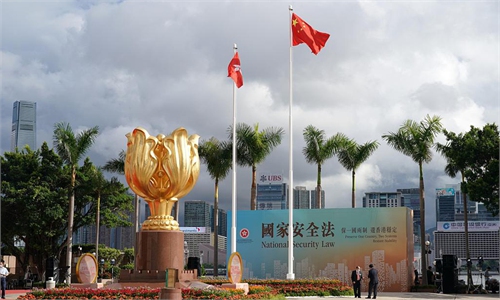HK is studying inclusion of crime of espionage into Article 23 legislation: SAR security chief

HK Photo:Xinhua
After Hong Kong's security chief Chris Tang Ping-keung revealed that local authorities are studying including the crime of espionage as part of the legislative scope of Article 23 of the Basic Law to strictly prevent modern-day spying, local legal experts said on Monday that it's a necessary move to prevent Hong Kong from being a center of espionage for countries like the US and the UK and it's a must that the city establish laws and regulations by taking into account non-traditional national security and cybersecurity issues.
While the Hong Kong Special Administrative Region (HKSAR) government previously indicated that the city would pass Article 23 - the city's own security law - within this year or next year at the latest, Tang told at a televisedprogram on Sunday that the local government is studying including the crime of espionage into the legislative scope as the old law on "theft of state secrets" was enacted long ago, which stipulated crimes such as drawing pictures inside a military facility.
Considered the rapid development of technologies, there have been a lot of espionage activities with new technology, and the old law may not be regulated, so we need to incorporate modern-day espionage in the relevant laws of "stealing state secret," the Hong Kong official was quoted as saying in media reports.
The official previously revealed that the HKSAR government is examining actions that fail to be covered by existing legislation, including gaps in espionage and networks, to develop effective and practical programs and provisions. The legislative direction and some provisions of Article 23 will cover espionage and crimes against national security on the internet, Tang said.
Besides, the HKSAR government will conduct "online patrol" to use soft measures to deal with online forces endangering national security and investigate the criminal responsibility of individuals or organizations engaged in illegal activities.
"Including the crime of espionage aims to prevent the city from being a center of espionage for countries such as the US and the UK," Willy Fu, a law professor who is also the director of the Chinese Association of Hong Kong & Macao Studies, told the Global Times on Monday.
The city should establish local norms for the maintenance and protection of state secrets and take into account non-traditional technological security, cybersecurity and other national security issues. This is in line with the legislative principles of Article 23, and plays a particularly important role in preventing, stopping and punishing espionage acts or solving incidents of espionage, Fu said.
Article 23 of the Basic Law requires the HKSAR to enact laws on its own to prohibit seven categories of acts that endanger national security, including treason, sedition, subversion and theft of state secrets.
And some of the crimes are already covered by the National Security Law (NSL) for Hong Kong, which prohibits secession, subversion, terrorist activities, and collusion with a foreign country or external forces to endanger national security.
In pushing forward the legislation linked to Article 23, the HKSAR government will consider the situation in Hong Kong society in recent years as well as the national security risks the city has been facing, including some people who endanger national security with "soft advocacy" or collusion with foreign forces, instigating activities to endanger national security online, Louis Chen, a member of the Election Committee and general secretary of the Hong Kong Legal Exchange Foundation, told the Global Times on Monday.
The NSL for Hong Kong and Article 23 of the Basic Law should complement each other. Although the NSL for Hong Kong covers the crime of secession and subversion of state power in Article 23 of the Basic Law, there are still five crimes that are not covered, and the national security risks faced by the society have become more complex, Chen noted.
"Without targeted laws, especially to deal with espionage, it's obviously not enough, so it is necessary to legislate the Article 23 as soon as possible to plug the loopholes of relevant national security, and more effectively prevent national security problems that may occur in the future," the expert said.



